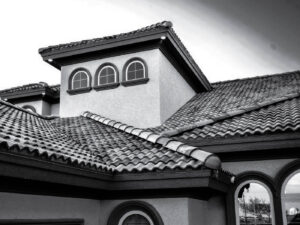Learn about the most common types of roof damage, how to spot them, and what you can do to protect your home from costly repairs.
Continue readingRepair or Replace Your Roof? 9 Factors to Evaluate
Is It Worth Repairing Your Roof?
Here's What Homeowners Need to Know
Your roof is one of the most critical components of your home. It protects you from the elements, boosts curb appeal, and safeguards your investment. But when your roof incurs damage—whether from age, a storm, or general wear and tear—you’re faced with an important question: should you repair it or replace it altogether?
Making the right decision requires a close evaluation of several factors. Below, we’ll explore what you need to know to make an informed choice, helping you weigh the pros and cons of repairing versus replacing your roof.
Things to Consider When Deciding Between Roof Repair and Replacement
1. Age of the Roof
The lifespan of a roof is largely determined by its material type. For instance, an asphalt shingle roof typically lasts 15–25 years, while metal and tile roofs can stretch beyond 50 years with proper maintenance.
If your roof is still within its expected lifespan and only has minor damage, repair is a cost-effective choice. However, if your roof is nearing the end of its useful life, repairs might be a short-term fix that delays the inevitable replacement.
Tip: Replacing an old roof could save you from frequent repairs and provide peace of mind for years to come.

2. Extent of Damage
The size and severity of the roofing issue have a significant impact on your decision. Isolated damage, such as a few missing shingles or minor leaks, can often be resolved with repairs.
However, if the damage covers a large portion of your roof or includes structural problems like a compromised decking layer, replacement might be the more practical solution.
Key Consideration: Extensive damage often costs almost as much as—or more than—a full replacement.
3. Underlying Issues
One advantage of roof replacement is the ability to uncover hidden problems. For example, water damage beneath the shingles may not be visible until the old roof is removed.
While repairs are focused on surface-level fixes, replacing the roof ensures a thorough inspection and resolution of any hidden issues, preventing bigger problems down the line.
Pro Tip: If moisture or mold has been detected, replacement is often the safest option.
4. Roof Type
The type of roofing material you have plays a critical role in the repair vs. replace decision. For instance:
- Wood Roofs: Wood roofs need regular maintenance, like sealing and cleaning, to prevent moisture damage. With proper care, they can last 30-50 years, offering a distinctive but high-maintenance option for homeowners.
- Asphalt Roofs: Repairs are simple, as individual shingles can be replaced easily. While they typically last 20-30 years, their low cost makes them a practical choice for many homeowners.
- Metal Roofs: Highly resistant to harsh weather, they can last 40-70 years depending on the material. Metal roofs reflect sunlight, reducing cooling costs, making them a sustainable and stylish option for homeowners seeking long-term value.
Your material choice matters not just in determining the scope of repairs but also when considering aesthetics. For older roofs, matching materials to the existing style can be challenging.
5. Imminent Weather Conditions
Is storm season around the corner? Weather impacts roof repair decisions in two ways. First, immediate repairs might be necessary to prevent further damage from heavy rain or high winds. Second, waiting to replace your roof until after the storm season may protect new materials from premature wear.
Tip: If time is of the essence, focus on temporary roof repairs to avoid additional costs down the road.
6. Future Plans for Your Home
How long you plan to stay in your current home will also influence your decision.
- Selling Soon? A new roof is an attractive selling feature that can influence your home’s resale value. Buyers may see it as one less thing to worry about, potentially increasing your asking price.
- Staying Long-Term? A quality replacement that extends your roof’s lifespan will save you money over time and reduce your annual repair expenses.
7. Energy Efficiency
Modern roofing materials offer better insulation and energy efficiency. If you’re considering a full replacement, you’ll have the opportunity to choose materials that reduce energy costs, such as metal roofs with reflective surfaces or green roofs that aid in temperature control.
While roof repairs won’t provide the same energy-saving benefits, upgrading to an energy-efficient roof can offset installation costs in the form of lower utility bills.
8. What About Re-Roofing? A Cost-Effective Alternative
If you want to avoid high costs but aren’t ready for a full replacement, re-roofing is a potential solution. This involves laying a new layer of shingles over the existing roof.
Advantages:
- Cheaper than full replacement
- Requires less time and labor
Drawbacks:
- Doesn’t address damage beneath the surface
- May not be allowed by local building codes if you already have two layers of shingles
Speak to your roofing contractor to determine if re-roofing is a viable option for your home.
9. Cost Comparison
Ultimately, cost is one of the biggest factors homeowners must weigh. Repairs tend to be less expensive, especially for small or localized issues, but they may only prolong the inevitable. Replacements, while seemingly more expensive upfront, come with long-term value through extended lifespan and reduced maintenance expenses.
To give you a better idea:
- Minor Repair Costs: Range from $300 to $1,000, depending on the damage scope.
- Full Replacement Costs: Range from $7,000 to $12,000 and up, depending on material and labor.
Remember: If an insurance claim covers roof damage, replacement might end up being a more affordable option after the deductible.
Weighing Your Options Carefully
Repair or replacement isn’t a choice to be made lightly. By considering the age and type of your roof, the extent of damage, weather conditions, and your long-term plans, you can make a decision that works best for your budget and home.
When in doubt, consult with a licensed roofing contractor for a detailed inspection. They can provide professional insights into what’s best for your specific situation and ensure you get the most value for your investment.
Need help deciding? Reach out to our roofing experts today for a complimentary assessment of your roof’s condition and personalized recommendations for the best course of action.

